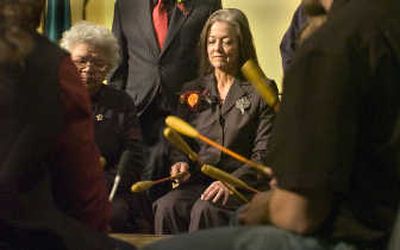Verner sworn in as Spokane mayor

Mary Verner was raised in Georgia, North Carolina and Alabama.
“There were expectations about me as a woman born in the Deep South that just didn’t fit my spirit, so I was eager to break away,” Verner said in an interview last week.
Verner left the South for the Virgin Islands, a degree at Yale and eventually a life in the Inland Northwest.
On Tuesday, her journey led her to the top elected position in Spokane.
“I am tremendously grateful for this opportunity. I take my place in support of my city,” she said in a two-minute speech right after she was sworn into office. “I submit myself in service to you, the members of my community, and I look forward to serving you as your mayor.”
Verner was sworn into office Tuesday in a ceremony that highlighted her connection to the Spokane Tribe of Indians, which brought her to the region for a job in 1992.
She was sworn in by her friend, Julia Pelc, a Spokane County Superior Court commissioner. The mayor’s 10-year-old son, Daniel Moore, held the Bible. Earlier, her 26-year-old daughter, Diane Rice, sang a hymn.
A few hundred people attended the ceremony at the Spokane Convention Center.
The event started with an introduction from Richard L. Sherwood, chairman of the Spokane Tribe of Indians. Verner beat a drum with the members of Lotmip, a Spokane tribal drum group, as they played three songs. Later, tribal member Pauline Flett gave a prayer in the Salish language.
“It’s a historic day not only for the city of Spokane, but for the Spokane Tribe to have the opportunity to come back to our aboriginal homeland and welcome a new leader, a new mayor of the city of Spokane,” Sherwood said at the start of the ceremony. “She’s done a lot for Indian people since she’s come to the Northwest.”
Verner, whose father’s family is part Seminole, Muskogee and Chickasaw as well as European, moved to the Inland Northwest to work for the tribe on natural resources issues. She later led the Upper Columbia United Tribes, a coalition that works on environmental policy.
Besides her paternal grandmother, who taught her native prayers, dances and other traditions, her family didn’t discuss their Indian ancestry much, Verner said. But she said her connection to her grandmother likely played a role in her decision to move to work for the tribe.
“Respect is fundamental,” Verner said in an interview last week. “For me Indian culture is that you’re respectful of all points of view and all people regardless of their stature and socioeconomic status.”
Verner is the third woman to become Spokane’s mayor, but she’s the first since the city switched to the strong mayor system. After growing up in a Southern culture that believed a woman’s place was in the home, she said she doesn’t think much about her gender any more.
“But I know that other people think about my gender, so it probably requires of me that I behave in a way that demonstrates that strong women can be strong mayors.”